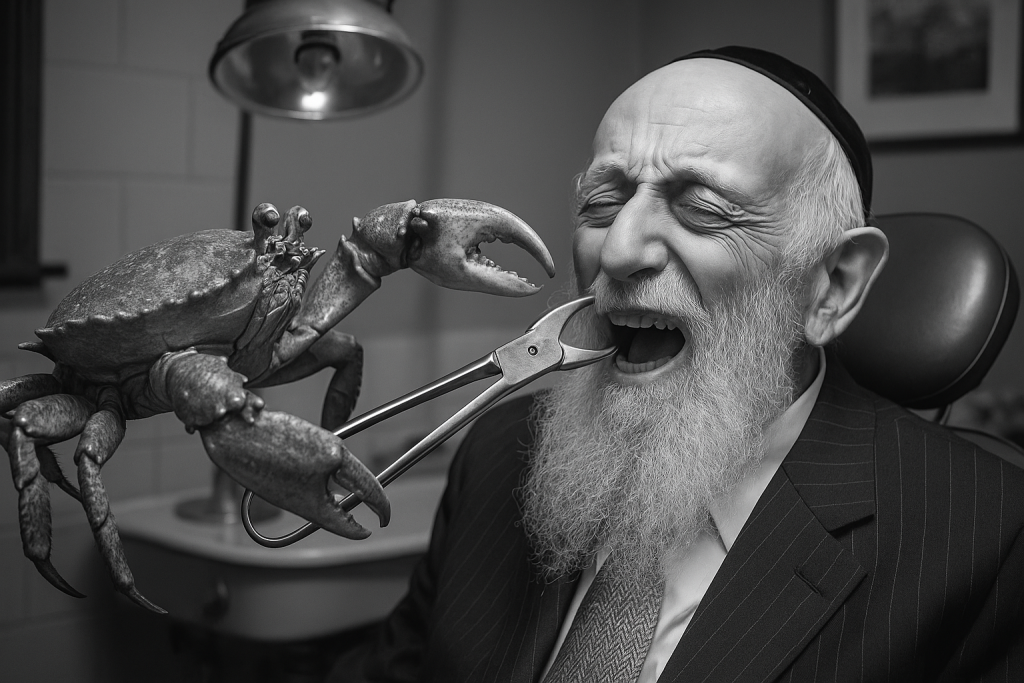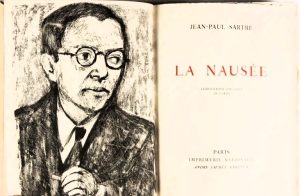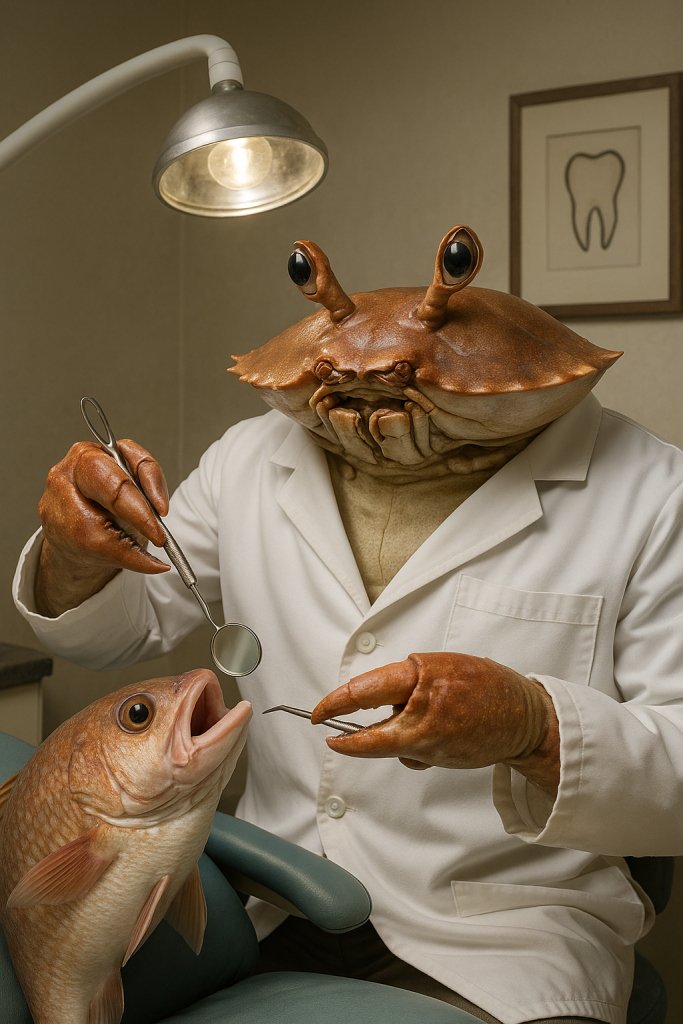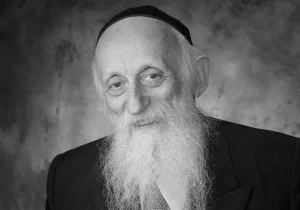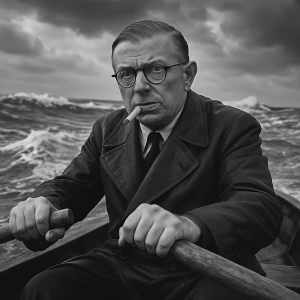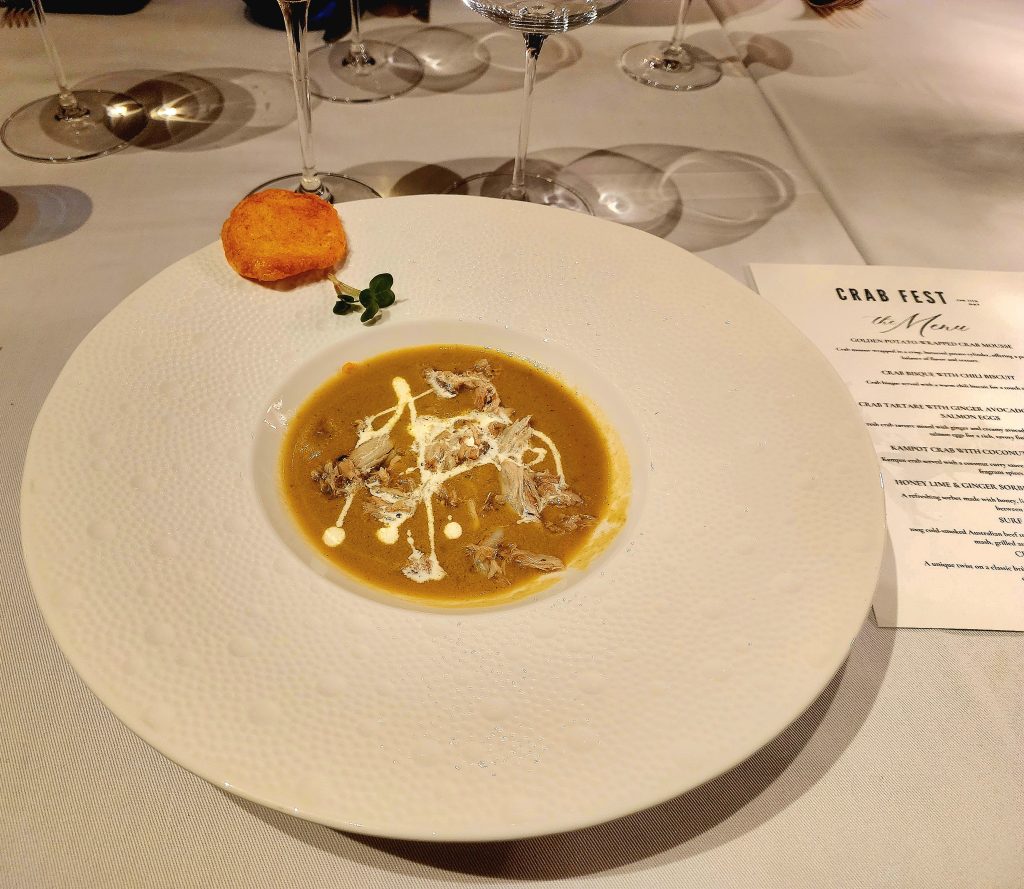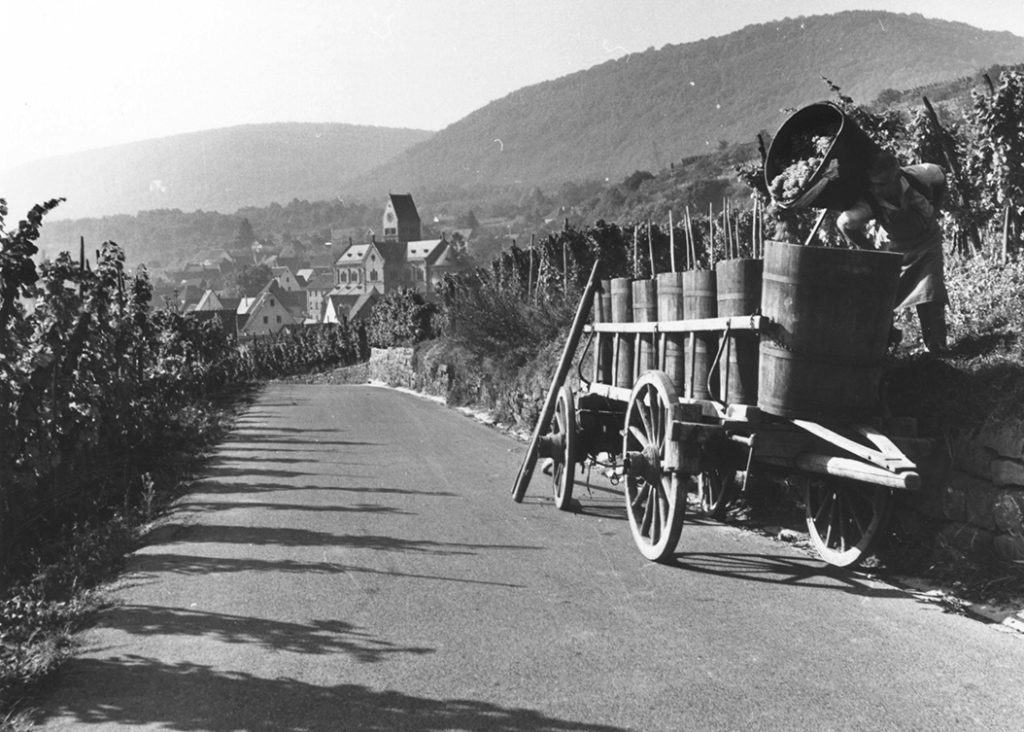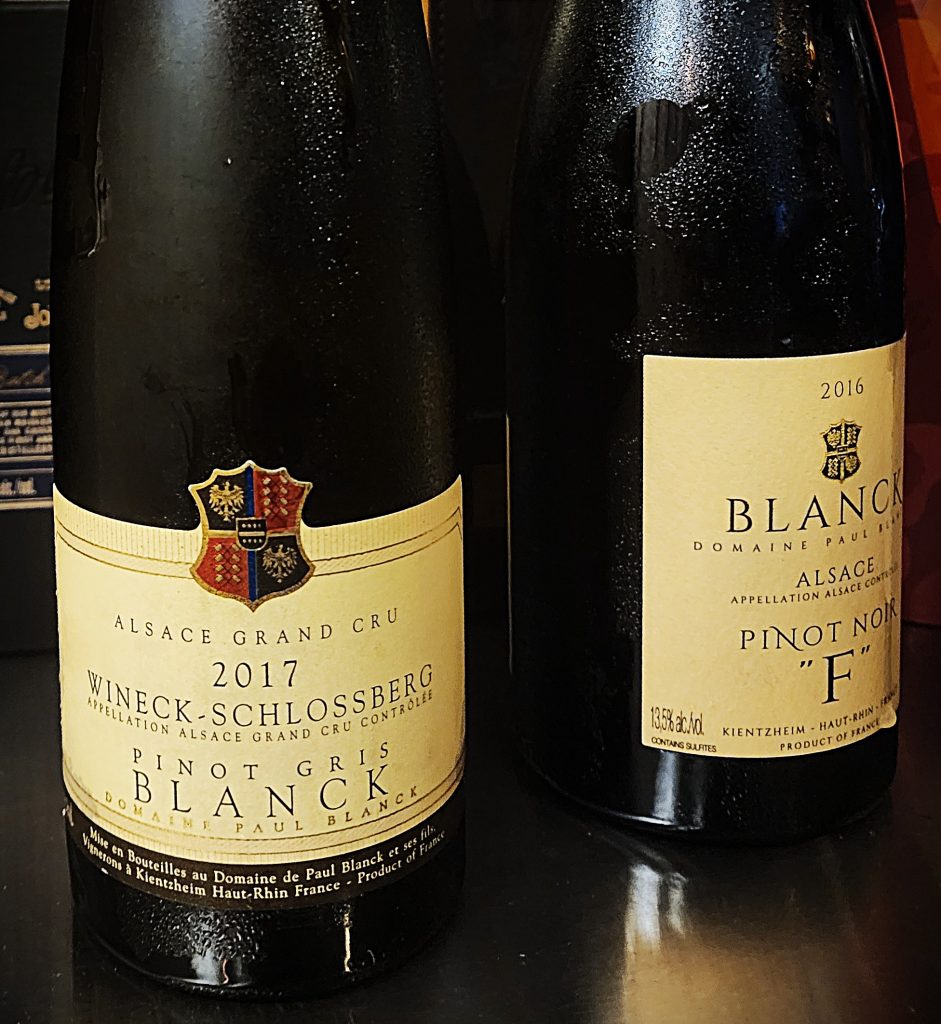CRAB FEST -ACT TWO: A Crab at the Dentist
“Only the guy who isn’t rowing has time to rock the boat.”
-Jean-Paul Sartre
‘Pour-Soi’ & ‘En-Soi’
Crabs even found their way into Sartre’s formative work on existentialism, ‘Being and Nothingness’, published in 1943. Sartre was a prisoner of war from 1940 to 1941; during his incarceration, he read Martin Heidegger’s seminal work ‘Being and Time’ (1927). Heidegger used Husserlian phenomenology to examine ontology, and Sartre would later ascribe his own path of philosophical inquiry to this work. To Sartre, crabs were armour-plated and solid on the outside, but a mess of muddled and mushy goop on the inside. As one commentator noted, perhaps Sartre ‘imagined this dichotomy as representative of the human condition: objectively we imagine ourselves as whole and sharply defined, when really, we are subjectively messy and inconsistent’. In Sartre’s novel La Nausée, (1938), the protagonist, Antoine Roquentin, is convinced that inanimate objects and situations encroach on his ability to define himself, on his intellectual and spiritual freedom, evoking in him a sense of nausea. Like imaginary crabs, disrupting the fabric of our reality.
Many consider Søren Kierkegaard the father of existentialism (1813 – 1855); he was indeed many things: a philosopher, religious writer, satirist, psychologist, journalist, and literary critic. His writings explored themes of individual existence, subjectivity, and the search for meaning in a seemingly meaningless world. Jean-Paul Sartre is a giant in the world of philosophy and, in particular, a central figure in existentialism. He emphasized individual freedom, the responsibility that goes with it, and the search for meaning in a meaningless world. He developed and articulated many core tenets of existentialism and argued that humans are condemned to be free, stating that we must choose our values and actions to create our own meaning in an indifferent world.
A Crab at the Dentist
One day, the Rabbi and psychiatrist, Dr. Abraham J. Twerski (1930 – 2021), was sitting in a dentist’s waiting room when he began leafing through a magazine, where he came across an article about marine crustaceans. As he read the article, he learned the outer shell does not expand, whilst inside the soft tissue continued to grow until the crustacean began to feel enormous pressure and became incredibly uncomfortable. “So it goes under a rock, casts off its shell, and produces a new, larger one,” he said.
The rabbi realized that the stimulus for the crustacean to be able to grow was to feel uncomfortable. He concluded that, “Times of stress are times that are signals for growth, and if we use adversity properly, we can grow through that adversity.” Sartre believed that our freedom is accompanied by anguish and that we must face our choices without resorting to self-deception or bad faith. Like crabs casting their shells, we must be prepared to take risks, ask hard questions of ourselves, and be prepared to be vulnerable to grow.
Rockstar
In 1964, Jean-Paul Sartre was awarded the Nobel Prize in Literature, yet despite having spent his entire career as a prolific writer and author, he declined to accept it. For Sartre, who seemed inexhaustible as a writer, writing was not enough; as an existentialist, he believed that freedom of choice came with a personal responsibility to act, and he was a man who was also an activist, one who championed many causes. According to Sartre, growth also meant making hard and sometimes even unpopular choices. At the height of his fame, he was likened to something of a rockstar of philosophy, a household name in France and arguably the most well-known philosopher of the twentieth century.
The biography Sartre: A Life (1987) by Annie Cohen-Solal describes a typical day for the philosopher; he would smoke two packs of cigarettes and several pipefuls of tobacco, drink more than a quart of alcohol (wine, beer, vodka, whisky…), gulp down two hundred milligrams of amphetamines, several grams of barbiturates, fifteen grams of aspirin, plus coffee, tea, and who knows what else. Sam Kelly in Philosophy Now writes, ‘He was bursting with ideas that he was desperate to share with the world, so he popped pills and drank coffee to increase his focus and enable him to keep writing at a breakneck pace without the need for rest. Once he finished writing, he was too revved up to sleep, so he would swallow barbiturates to knock himself out. When he finally awoke the next day, he would pop more amphetamines to cut through the fog of sleep, so he could once again write obsessively all day and into the night.’ Eventually and inevitably, his health began to deteriorate; he lost all sight in his already bad eyes, and he slowly began to lose control of the many things we do intuitively and take for granted in good health. In ‘La cérémonie des adieux’, Simone de Beauvoir chronicled the deterioration and struggle of his last decade, and her struggle to keep death from her soul-mate’s doorstep.
On Saturday, 19th April 1980, Sartre’s funeral procession “started at the hospital at 2:00 p.m., then filed through the fourteenth arrondissement, past all Sartre’s haunts, and entered the cemetery through the gate on the Boulevard Edgar Quinet.” (Cohen-Solal, Annie 1987.) Fifty thousand Parisians descended onto Boulevard du Montparnasse to accompany Sartre’s retinue.
“Life has no meaning a priori… It is up to you to give it a meaning, and value is nothing but the meaning that you choose.”
― Jean-Paul Sartre
ACT TWO
CRAB BISQUE WITH CHILI BISCUIT Crab bisque served with a warm chilli biscuit for a touch of spice.
Domaine Paul Blanck, Wineck-Schlossberg Pinot Gris, GRAND CRU, Alsace, France, 2017
The next dish was a beautiful crab bisque, creamy, with some richness, great intensity, and wonderful depth of flavour. The crab meat was sweet and the chilli biscuit a nice and complementary counterpoint of crunch and subtle spice. The paired wine was an incredible Grand Cru Pinot Gris from Domaine Paul Blanck. The winery was founded by Hans Blanck, who acquired vineyards in the region in 1610. The Wineck Schlossberg Grand Cru appellation is located in the communes of Katzenthal and Ammerschwihr, in the Haut-Rhin department of Alsace. One of the fifty-one Grands Crus of Alsace, it lies just eight kilometres west of the city of Colmar.
At the heart of this beautiful Grand Cru is the 12th-century Castle Wineck, standing guard over its vines like a sentinel. The vineyard is a cup-shaped appellation, protected from the harsh winds and strong rains that slam into the Vosges Mountains. The vineyard area here was previously known as simply Schlossberg, which meant ‘hill with the castle.’ It was granted Grand Cru status in 1985. However, since 1992, it has been officially recognized as Wineck-Schlossberg; this not only pays homage to its chivalrous heritage, but it also differentiates it from the Grand Cru Schlossberg of Kaysersberg.
The wine has a lovely, intense lemon colour, showing hints of tertiary development. The bouquet is outstanding, extraordinary for its purity, and its lifted, fruitful character: sun-dried apricot and papaya, candied lemon, mandarin zest, pomelo pith, persimmon, bergamot; it is all here and complemented by hints of ginger and floral spices. On the palate, the wine offers up clean, ripe, and lush fruit, rolling onto the palate, pristine and semi-sweet. Then the tension arrives: minerals, citrus acidity, and gingerbread spices all contribute to the wine’s wonderful complexity. This is a brilliant wine, a magnificent expression of the unique qualities of Alsace Pinot Gris and especially the terroir of Wineck-Schlossberg. It is all about elegance, balance, and finesse and is drinking at its absolute peak. Very classy, just a superb wine from one of Alsace’s absolute best producers.
Darren Gall

